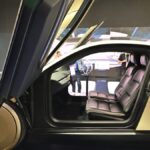China has banned automakers in the country from marketing their vehicles with grandiose terms such as “smart driving” or “autonomous driving” following a fatal crash involving a Xiaomi SU7. The car was in driver assistance mode as the vehicle approached a construction zone, but the driver took control only just before the car hit a concrete barrier. Three passengers were killed in the accident.
The problem with any assistance system below Level 4—in which a vehicle can operate entirely without human intervention—is that drivers are still required to pay attention to the road and intervene as needed, but complacency sets in. By the time the driver realizes that an accident might occur, it can be too late. It is the primary reason why Tesla and CEO Elon Musk have been criticized for rolling out autonomous driving capabilities with terms like “Autopilot” and “Full Self-Driving.” To protect itself from liability, Tesla now hedges in its language, referring to its most advanced system as “Full Self-Driving (Supervised),” and the company monitors drivers to ensure they have their hands on the wheel.
The new rules set forth by Chinese authorities also state that automakers can not use car owners as guinea pigs to test new updates to their driver assistance programs. Any new algorithm updates must undergo a battery of tests before they can be delivered to vehicles over the air. Starting in 2026, new battery safety standards will also be implemented in an attempt to curb fires.
For all its problems, one nice thing about a single-party dictatorship like China is that it can make policy moves quickly. In the United States, a similar move to ban marketing language would get caught up in lawsuits and regulatory challenges for years.
Case in point: Back in 2022, the California DMV accused Tesla of falsely portraying its vehicles as autonomous based on its marketing language. The company’s vehicles have been at the center of high-profile crashes that involved some level of driver assistance, and critics say Musk’s autonomy claims have led some drivers to overestimate its abilities. But Tesla argued it was within its free speech rights to use the language, and no action was taken.
China’s dictatorship is the same reason why the country has been able to out-innovate the United States in electric vehicles as a whole—the Communist Party decided they matter, and nobody in the country is going to dissent. Democracy moves much slower, though that is a good thing and by design; occasionally, a little authoritarian muscle has its benefits.
Tesla has long claimed that its autonomous software makers drivers safer, but the company has nonetheless faced a slew of regulatory investigations in the United States over the years, with the National Highway Transportation Safety Board most recently initiating a probe into Tesla’s “Smart Summon” feature that allows vehicles to navigate short distances, such as through a parking lot, without the driver being inside. The agency has been a thorn in Musk’s side for quite some time:
A report in 2022 released by the NHTSA claimed that, in the preceding twelve-month period, Teslas accounted for some 70 percent of the car crashes that involved driver-assist systems. Tesla’s driver-assisted function, Autopilot, has often been criticized, with regulators speculating that it may be playing a role in crashes. Indeed, the NHTSA published yet another report this past April that claimed Tesla’s Autopilot function had a “critical safety gap” that could be linked to hundreds of crashes. An analysis conducted by the Washington Post last summer similarly found that Tesla’s Autopilot function had been involved in a total of 17 fatalities and as many as 736 crashes since 2019. The newspaper again cited NHTSA statistics.
The NHTSA’s reporting that Teslas are involved in such a large number of fatal crashes is thanks to Biden-era rules that required automakers to inform the agency whenever a car using autonomous software was involved in a crash. Back in December, it was reported that the Trump transition team was considering the possibility of killing the rule.
Acolytes of Tesla claim that its Full Self-Driving technology is nearing a point where it will be able to fully operate vehicles on its own. The company says it plans on launching an autonomous cab service in Austin by the end of the year. Musk has missed his stated projections for full autonomy going back to 2016, when he said Tesla vehicles would be able to drive themselves within a year. In 2019, he predicted that over a million robotaxis would be on the road by 2020.
It turns out that the last 10% of solving autonomy might have been the hardest part, but other companies, including Waymo, are starting to get there, rolling out fully autonomous services across the U.S. at a rapid pace. In China, automakers like BYD have been rolling out their own self-driving features, suggesting that Tesla does not command the lead it once did.
Read the full article here












